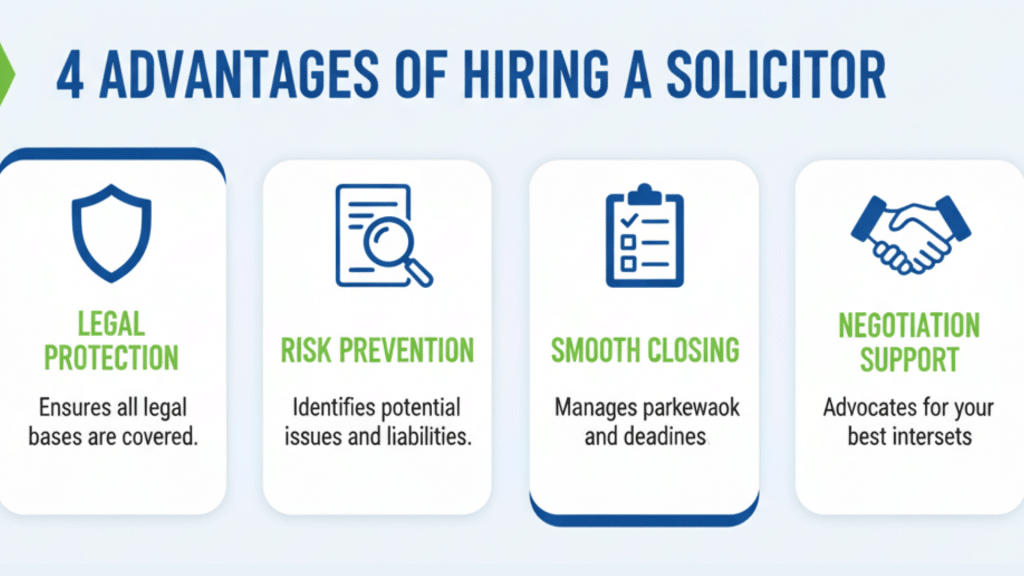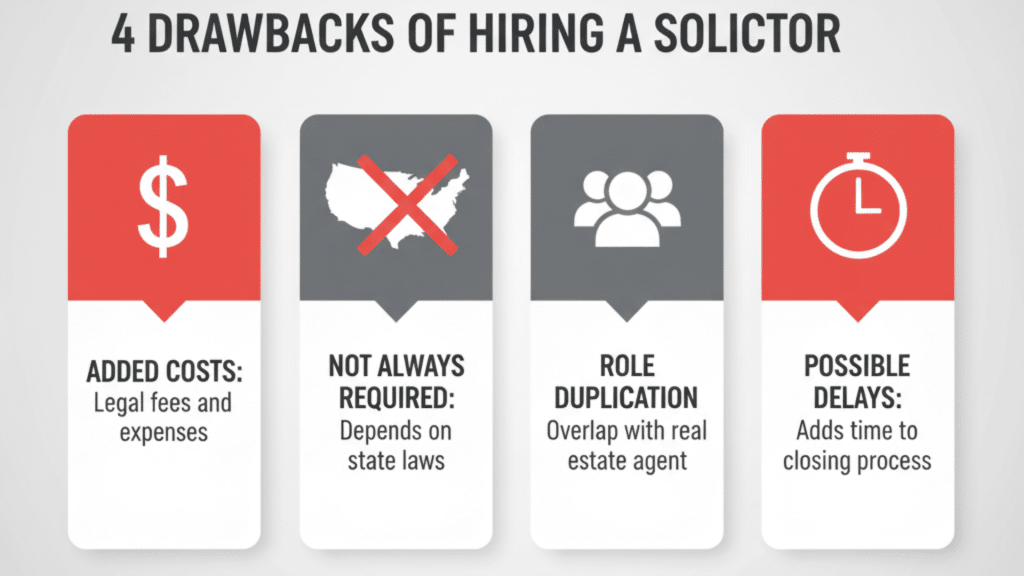Buying a home raises one question that confuses almost everyone: Do I really need to hire a solicitor or an attorney to buy a house?
The answer isn’t straightforward. Some states require it by law. Others make it optional. The costs can range from $800 to $2,500 in addition to your other closing expenses.
However, what most people don’t realize is that the decision depends on more than just legal requirements. Your property type, transaction complexity, and comfort level all matter.
This guide breaks down exactly when you need legal help and when you can skip it.
You’ll learn the key differences between solicitors, attorneys, and agents, plus the real advantages and drawbacks of hiring legal professionals for your home purchase.
What Is a Solicitor in Real Estate?
A solicitor in real estate is a legal professional who handles property transactions, primarily used in the UK and Commonwealth countries.
In the United States, they’re called real estate attorneys and serve the same function, ensuring your home purchase is legally sound.
Unlike real estate agents who find and negotiate properties, solicitors focus solely on the legal aspects of buying and selling homes.
Here’s the simple breakdown you need to know:
The terms “solicitor,” “real estate attorney,” and “real estate agent” get mixed up all the time. Let’s clear up the confusion right away. They’re completely different roles.
- Solicitor: A legal professional who handles property transactions in countries like the UK. Think of them as your legal guide through the buying process.
- Real estate attorney: The U.S. equivalent, licensed to practice law and represent you in property purchases. Same job, different title.
- Real estate agent: Helps you find and negotiate on a property, but cannot provide legal advice. They’re great at finding homes and handling negotiations, but that’s where their role ends.
What Does a Solicitor/Attorney Do?
A solicitor or attorney makes sure your home purchase is legally sound. They’re like your legal bodyguard during the transaction. Here’s what they actually do for you:
- Review and draft contracts – They read the fine print, so you don’t have to worry about hidden clauses
- Conduct a title search to confirm ownership. This ensures the seller actually owns the property and can legally sell it
- Flag issues like liens, easements, or zoning disputes. They spot problems before they become your problems
- Oversee the closing process – They ensure money and documents are transferred correctly on closing day
Is a Solicitor Required to Buy a House?
It depends entirely on where you live. Some places require it by law. Others leave it up to you. Let me break down exactly what you need to know. In the United States, the Law Varies by State
The rules change depending on the state in which you’re buying. Some states say “you must have an attorney.” Others say, “it’s your choice.”
States That Require an Attorney by Law

If you’re buying a house in one of these states, you must hire an attorney to handle the closing:
- New York
- Georgia
- South Carolina
- North Carolina
- Massachusetts
- Delaware
- West Virginia
No exceptions here. The law requires it, so you’ll need to budget for attorney fees as part of your closing costs.
States Where It’s Optional

In most other states, title companies and real estate agents manage the process. While hiring a solicitor isn’t mandatory, it can still be beneficial, especially for complex transactions.
California, Texas, Florida, Arizona, Colorado, Michigan, Ohio, Pennsylvania, Illinois, and most others not listed in the mandatory category.
You have the freedom to choose. However, remember that just because you can skip the attorney doesn’t always mean you should.
This provides readers with the specific state names they need to know, where hiring an attorney is a choice rather than a legal requirement.
International Perspective
Things work differently outside the U.S. In the UK and many Commonwealth countries, using a solicitor is the standard practice for property purchases.
This is why you'll often see the term "solicitor" used interchangeably with "real estate attorney." It's not really a question of "do I need one?" It's just how the system works there.
Check your local laws first. Then decide if the extra protection is worth it for your situation.
Advantages of Hiring a Solicitor

Hiring a solicitor or real estate attorney isn’t just about meeting legal requirements; it can also save you from costly mistakes.
Think of it as insurance for one of the biggest purchases of your life. Here’s what you get when you bring legal help on board.
1. Legal Protection
- Ensures all contracts comply with state laws – Every state has different rules about real estate transactions. Your attorney knows these inside and out.
- Prevents fraud or disputes over property ownership – They verify the seller actually owns the property and has the right to sell it. No nasty surprises later.
2. Smoother Closing
- Handles paperwork and deadlines – Real estate deals involve tons of documents with strict timelines. Miss one deadline and your deal could fall apart.
- Reduces the risk of delays that could derail the deal – They know what needs to happen when, keeping everything on track toward your closing date.
3. Negotiation Support
- Advises you on contract terms, contingencies, and disclosures – They explain what each clause means and how it affects you. No more wondering if you’re signing something bad.
- Protects your interests during repair or inspection negotiations – When issues arise, they help you respond in a way that protects your finances and timeline.
4. Peace of Mind
- Especially valuable for first-time buyers who may feel overwhelmed – Buying a home is stressful enough without worrying about legal issues. Having an expert in your corner helps you sleep better.
- Someone always has your back during the process – When questions arise or problems pop up, you have a professional to call who’s looking out for your interests.
Drawbacks of Hiring a Solicitor

Let’s be honest, hiring a solicitor isn’t always the perfect solution. While there are clear benefits, it’s important to weigh the potential drawbacks:
1. Added Costs
- Legal fees typically range from $800 to $2,500. This is in addition to all your other closing costs, such as inspections, appraisals, and title insurance.
- Can increase closing expenses, especially in straightforward deals. If you’re buying a simple single-family home with no complications, those attorney fees might seem excessive.
2. May Be Unnecessary in Some States
- In states where title companies handle most of the legal process, hiring a solicitor can feel redundant – You’re essentially paying twice for similar services when the system already works smoothly without an attorney.
- Title companies are often well-equipped to handle routine transactions – They’ve done thousands of closings and know the process inside and out.
3. Risk of Overlap with Other Professionals
- Real estate agents and title companies already cover parts of the transaction – Your agent handles negotiations, the title company manages paperwork, so what’s left for the attorney?
- Without a clear role division, services may overlap – You might find yourself paying multiple people to do similar tasks, which wastes money and creates confusion about who’s responsible for what.
4. Possible Delays if Not Experienced
- Choosing the wrong solicitor may slow the process – an attorney who rarely handles real estate deals might need extra time to understand the details.
- Inexperienced attorneys can cause more stress than relief – Instead of smoothing the process, they might ask for unnecessary delays or documentation that holds up your closing.
How to Choose the Right Solicitor or Attorney?
Picking the right legal expert can make your home purchase smooth, stress-free, and legally secure.
| Category | What to Look For | Why It Matters |
|---|---|---|
| Qualifications | Licensed in your state, Real estate law expert, Local reputation | Proves they’re qualified and experienced. |
| Questions | What’s your fee? Handled similar cases? How will you update me? | Clarifies cost, experience, and updates. |
| Red Flags | Hidden fees, no property law focus, Slow replies | Avoids delays, stress, and extra costs. |
When Should You Definitely Hire a Solicitor?

Even if it’s optional, there are scenarios where hiring a solicitor is highly recommended; some situations are simply too risky to handle alone. Here’s when you should absolutely get legal help.
- Buying in a state that legally requires an attorney – You have no choice here, so budget for it from the start.
- Purchasing foreclosure or short-sale properties – These deals often have hidden complications that only a legal expert can identify.
- Handling disputes (liens, joint ownership, probate sales) – Complex ownership issues need professional legal guidance to avoid costly mistakes.
- Buying commercial or mixed-use property – Business property deals involve different laws and much higher stakes than residential purchases.
- If you’re a first-time homebuyer who wants added protection, The extra cost is worth avoiding beginner mistakes that could cost thousands later.
Final Notes
So, do you need a solicitor to buy a house? It comes down to three key factors: your state’s laws, the complexity of your transaction, and your comfort level.
If you’re in mandatory states like New York or Georgia, the choice is made for you. For others, evaluate your situation.
Foreclosure properties? Get legal help. Simple suburban home? A title company might suffice.
Attorney fees of $800-$2,500 may seem steep, but they are small compared to the costly legal problems that may arise later. First-time buyers, in particular, benefit from expert guidance.
Ready to decide? Research your state’s requirements first, then assess your specific situation. When in doubt, consult a real estate attorney to determine if their services align with your needs.














